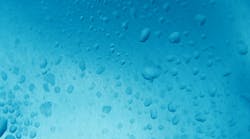Do you prefer bottled water from the French Alps, or out of the tap from Lake Michigan?
According to lab tests commissioned by the Sun-Times, it's basically the same--give or take a few harmless bacteria.
For those who prefer the fancy bottled stuff, the difference may just be a matter of taste.
Loading bottled water into his shopping cart at an Evanston Jewel last week, Ravenswood Manor resident Craig Dirksen, 32, said, "I prefer the taste. I used to drink tap water, but somebody gave me one of these a couple of years ago, and I haven't touched tap water since."
With names such as Sparkling Spring and Crystal Geyser, bottled waters hype purity.
Those claims are supported by lab tests conducted recently for this newspaper. ARRO Laboratory Inc. did bacteria testing on the region's top 10 best-selling brands.
ARRO, a state-certified facility in Joliet, also tested tap water in Chicago and four suburbs. The tap water, while generally containing a little more bacteria than the bottled brands--harmless, naturally occurring bacteria--was well within federal guidelines for drinking water. It won't make anybody sick.
A much more obvious difference between bottled and municipal water is cost. Even in the most expensive suburbs, residents pay less than $6 for 1,000 gallons. Bottled water can cost 2,000 times that much.
In the words of a joke making the rounds on the Internet, "For a clue about people who spend $1.50 for a little bottle of Evian, try spelling Evian backwards."
But bottled water drinkers, who spent $4.9 billion on the product last year, say it's worth the added expense. It's not just the supposed health benefits. A recent sampling of Chicagoans says they care more about other factors.
The survey, conducted by Yankelovich Partners for the International Bottled Water Association, found that 59 percent of bottled water fans here said taste was the No. 1 reason. At 54 percent, convenience was No. 2--carrying around a bottle or keeping one at your work station, for example.
As for purity, bottled water drinkers cited its source at 37 percent and "trust in its treatment" at 33 percent among reasons they drink it.
Sue Hawkins, 43, said the quality of tap water at her Evanston home "is so bad I don't even like to wash dishes in it. Next door is OK; it's my particular line."
Variability in taste of Chicago's tap water "makes you think about what's in it and what they do to it," said Jackie Robinson, 23, of Rogers Park. "With the bottled water, you can read the label and see what's in it."
That's only true up to a point, said Doug Marsano of the American Waterworks Association, a utilities group. He noted that bottled water need not identify its source on the label.
"Fifty percent of the bottled water manufacturers use tap water," he said.
It's obvious why, Marsano said. Municipal water must meet federal health standards, and it's cheap and plentiful.
Unlike bottled water manufacturers, the nation's public water utilities must tell customers annually not only where their water comes from but how it is treated.
Stephen Kay, spokesman for the International Bottled Water Association, noted that while bottlers may begin with ordinary tap water, "typically it's processed and purified further."
That may or may not make it safer than tap water. A Mississippi State University study concluded: "In terms of bacteria content, it is questionable as to whether bottled water is better than most municipal water."
And in a report by the Natural Resources Defense Council titled "Bottled Water: Pure Drink or Pure Hype?," the environmental group cautioned, "No one should assume that just because water comes from a bottle, that it is necessarily any purer or safer than most tap water."
Regulated by the U.S. Food and Drug Administration--not, as are public water supplies, by the Environmental Protection Agency--bottled water is "a food product," Kay said. "We don't consider tap water to be the competition. We compete for stomach space with sodas, coffees, teas and juices."
On the question of labeling, he said, "Orange juice doesn't have to identify the orchard it's from."
Aquafina, one of the top-selling brands, starts out in this area as Chicago tap water, but doesn't say so on the label. More forthcoming is another popular brand, Nursery, aimed at the baby market. It says "Source: Municipal Water Supply, Chicago" on its gallon jugs.
The label is silent on the source of Sparkling Spring water. But callers to an 800 number are told it has been drawn from an artesian well--not a spring by modern definition--in north suburban Highland Park for more than 100 years. Today, it also is bottled at an artesian well in south suburban Sauk Village.
Whatever its origin, "you find a consistency of taste in bottled water," Kay said. "There are no pipes [as in a home or municipal distribution system] that can affect it."
Chicago area tap water is notorious for tasting funky late in the summer. "It's an earthy, musty smell; you don't actually taste it," said Bruce Rittmann, a Northwestern University professor of environmental engineering.
The odor hasn't shown up this year, probably because it's been relatively cool. But in hotter summers, the sun penetrates deep into Lake Michigan, source of most of the region's drinking water, promoting the growth of photosynthetic microorganisms that stink up the water.
Odor aside, the Metropolitan Water Reclamation District and other treatment facilities do an excellent job of making municipal water safe, Rittmann said.
"I generally drink tap water," he said. "That doesn't mean I always like the taste of it, but I don't worry about getting sick."
***
Chicago faucets do the job in taste test
Chicago tap water performed respectably in a blind taste test pitting it against the area's top 10 best-selling bottled waters.
And it would have done better if panelist T.J. Armour hadn't given it his lowest rating, 2 points on a scale of 10. He wrote "Oh no!" on his scoring sheet.
The city's tap water tied with Aquafina for fifth place. Interestingly, both get their start in Lake Michigan.
On the panel with Armour, a sophomore in television production at Columbia College, were wine expert Brian Duncan from Bin 36, a downtown restaurant, wine bar and market, and Joe Pecoraro, a Chicago Park District consultant and longtime former superintendent of the city's beaches and pools.
In their taste test, conducted Friday at the Chicago Sun-Times, Crystal Geyser was the clear winner. The brand, collected at a spring in the Blue Ridge Mountains of Tennessee, averaged 8.3 points.
It got a "10" from Duncan, who wrote, "This one had the most neutral profile with no unpleasant chemical tones, bitterness or aftertastes."
Sparkling Spring came in second with 6 points. The third-, fourth- and fifth-place finishers were all ties--Evian with Hinckley Springs (5.7), Ice Mountain with Buffalo Don's (5.3), and Chicago tap water with Aquafina (5).
Nursery was rated 4.3, and Dannon and Poland Spring tied for last with 3.7.
Without being asked, both Armour and Duncan guessed right about which sample was the Chicago water. Pecoraro gave it his highest rating, a 7.
But the former beach boss added that, in general, "As a person swimming in it more than drinking it, they were all pretty much the same."
How do the bottled, faucet kind compare?
Q. How popular is bottled water?
A. Consumption rose 13 percent last year, to 4.25 billion gallons or 15.5 gallons per person. Sales hit $4.9 billion.
Q. In Chicago, how does it do in comparison with tap water?
A. A survey done for an industry group said we average 6.1 servings of water per day--3.8 are from the tap water, 2.3 from bottles.
Q. Which one is healthier?
A. That's debatable. Using filters, ultraviolet light, reverse osmosis or other methods, bottled water manufacturers often get rid of more bacteria than municipal utilities. But the chlorine used to treat tap water effectively rids it of disease-causing bacteria. Some studies have found no appreciable difference in safety.
Q. Does chlorine always work?
A. Not against cryptosporidium. In 1993, up to 100 people died when this protozoan got into Milwaukee's Lake Michigan water supply, probably from feedlots. This coincided with a failure of the city's filtration system. "There is no cryptosporidium challenge [in the Chicago area] right now," says Northwestern University professor Bruce Rittmann.
Q. How often are public water systems tested?
A. Every month for coliform bacteria. Communities do their own testing through a state-certified lab or pay the Illinois Environmental Protection Agency to do it. Any finding above zero triggers a followup test, plus testing at upstream and downstream sites.
Q. Are tap water and bottled water ever one and the same?
A. Yes. Denver, home of the American Water Works Association, bottles and sells its tap water. Chicago sold more than 300,000 bottles of "Chicago's Great Lake Water" this year until the bottler got out of the business.
Q. Can bottled water "spoil" if not refrigerated?
A. As long as it remains sealed and stored in a cool place away from direct sunlight, bottled water has an indefinite shelf life, says the International Bottled Water Association.
Q. Where can I get more information?
A. International Bottled Water Association: (800)928-3711, www.bottledwater .org; American Waterworks Association: www.awwa.org; U.S. Environmental Protection Agency: (800) 426-4791, www.epa .gov/safewater.
Source: The Chicago Sun-Times

